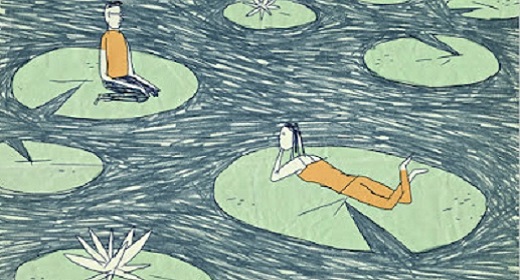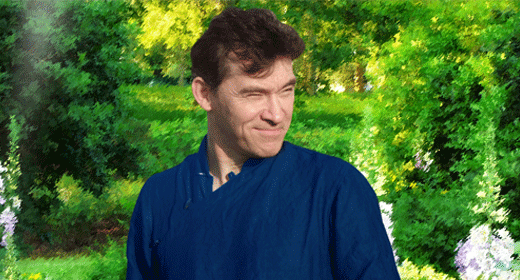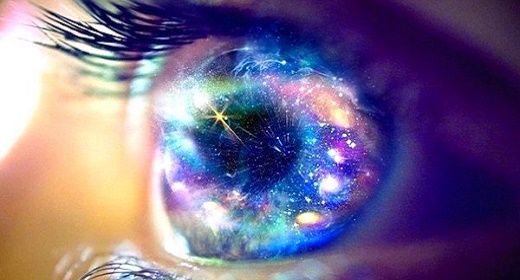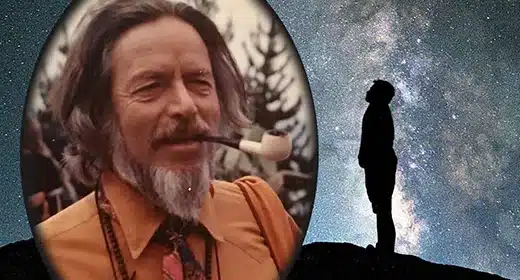by Donna Quesada: 1. “What is the use of planning to be able to eat next week unless I can really enjoy the meals when they come?”
Alan Watts says that we separate ourselves from our experiences, which conveys the meaning of this quote. The way I usually explain this idea to my own students is by pointing out how we’re in a constant state of reaching. In our minds, we are always looking toward the next thing… anticipating what we think will finally make us content. We want to be there rather than here.
At any moment, we are either rerunning the past or anticipating the future…even though neither the past nor the future exist. So, therefore, we’re not in this moment, and we’re not in the past or the future either. Thus, by spinning around in our heads, we’re separated from our experience. And by living in a state of separation from our experiences, we never really enjoy anything.
He says that we need to align ourselves with our experiences while we’re having the experience. And the way to do that is by dropping the narrative, even if it’s a positive one, like “this is fun”… because there’s no way to have fun if we’re busy explaining how much fun we’re having.
By dropping the commentary, we’re getting with the present moment. Put simply, by letting go of the thoughts aboutour experiences, we align with the experience. And this alignment is what sets us free from the noise of the mind, which is mostly due to the constant craving for the next thing or for something different.
May we enjoy our meals while we are eating them!
2. “If everyone was rich, no one would be rich.”
Here, Alan Watts is talking about the relativity of meaning… what he referred to as ”the universe of relativity.” In this example, we couldn’t know what poor was, if we didn’t also know what rich was. I can only make sense out of the one concept by comparing it to the other. So there’s a dependency there. One idea is relative to the other.
But going deeper, it means that there’s no inherent value there. The value is in our minds. It comes from the fact that we project an “either/or” split onto the world. We are in the habit of seeing things in terms of dualistic categories. We impose contradictory pairs of opposites onto reality, thereby chopping it up into arbitrary pieces.
He has called this tendency “the fragmentation of consciousness”… We look at reality in terms of “me” and “the other.” We look around and see things in terms of good/bad; artificial/natural; human/animal; past/future, thoughts/matter; subject/object, God/humans, mind/body, etc.
This last one, mind/body, has had a heavy hand in shaping western civilization. It goes all the way back to Plato, and then was popularized by Descartes’ “I think, therefore, I am.” The ultimate dualistic portrait of reality. I think, therefore I am is a way of pronouncing “I am mind”… and everything else is either nonexistent or else some sort of matter that’s not me. This separation—between me and everything else—is something we feel very comfortable with, here in the west.
The Zen way of thinking is more holistic and suggests that there’s a mutual dependency between all these sets ofopposites, such that they’re not really opposite at all.
To stay with the mind/body split for the sake of example, consider the way the mind and body are inextricably connected. All I have to do is think about the thing I fear the most and I can feel my heart beating a bit faster… I can feel the anxious feeling rise up in my belly. Mind… whatever that really is, affects body most immediately. And vice versa. When our body is placed in a stressful or painful situation, the mind is immediately affected and interprets the situation as dangerous. They’re connected. They’re one.
Like all the other dualistic “opposites,” they’re also complementary, and are better seen as different parts of one whole system. Without one part, the other couldn’t exist. To echo the quote… without the concept of rich, poorcouldn’t exist.
3. “There’s always only one dish to wash.”
When we do things that we consider to be chores, like the dishes, we try to get it over with, so that we can go and do the thing that we’d prefer to do. And if there are lots of the unwanted thing, like the dishes, then it’s all the more painful.
But, if I’m washing the dishes and I’m truly here while washing them, then I’m just washing a dish. One dish. I haven’t got my head full of what I’ve got to get through in order to get to where I really want to go…. because I’ve gotta finish this before I can do that.
I see my students doing that in class and sometimes we all have a laugh about it… They look at the clock 10 minutes in advance of the end of class, and they’re moving all around and gathering their keys and shuffling around, digging in their backpack and putting things away. I say, “Where are you going?”
To their next class, of course, but what are they gonna do when they get there? They’re going to watch the clock and shuffle around and rush to the next class! Then, toward the end of their last class, they’ll do the same thing…but then they’ll be rushing to get home. And when they get home, they’ll be bored and look for somewhere else to go!
It’s like that Seinfeld episode where George goes to watch TV at Jerry’s house, and Jerry says “why don’t you watch TV at your own house?” And George says, “cause at least when I’m here, I feel like I’m doing something…I’m out!”
We go through life like that… Just trying to get through our youth so that we can be adults, and pursue the job of our dreams. If and when that happens, we dream about vacation or retirement. Then, when we reach retirement, we think “if only I could be young again!” We’re always reaching.
It’s the I’ll be happy when affliction.
4. ”What is true and positive is too real and too living to be described and to try to describe it is like putting red paint on a red rose.”
Watts is saying that there is no way to describe the present moment. The Now is moving and fluid, like flowing water. It doesn’t stand still long enough to wrap it up by any means, least of all by way of words. As soon as we even try, we’re not only attempting to nail down what can’t be nailed down, but we’re then separating ourselves from the experience… trying to describe it, rather than being it.
Where Zen gets even more interesting, is that it all comes back to “getting over” the self. And this may be the single most notable difference between Zen and other spiritual traditions. It’s not that other spiritual traditions don’t also talk about the problem of “the self.” They do… They know we have to get over the ego.
The difference is that other religions say that we’ve got to get over the self in order to enter into a “higher realm,”which we might call the true self. We’ve got to know who we really are… our permanent essence. Zen asks, “Where is this special realm?” “Where is this permanent essence?”
It’s just another concept in your head! You’re fantasizing!… It’s your imagination! Zen would say.
Because we too, like all of reality, are changing every second.
In this sense, Zen is not a spiritual discipline at all. There’s nothing mystic about it. It’s about waking up to the ordinary, fluctuating, rise and fall of life in this moment. And the next moment, and the next. And the moment we try to capture it, it’s gone. It’s about right here, right now. It’s about doing the dishes. Waking up, from the point of view of Zen, is no more, and no less than that.
That’s why when you ask a Zen master some deep question like, what are we? Or, why are we here? The Zen master will simply say “take out the trash.”
They’re trying to snap you out of it. To come back here. Because that’s all there is. But we’re always looking for our true selves, we’re looking for some big prize, and to solve some big mystery.
5. “Words are coins for real things.”
Continuing with the emphasis that Zen places on the fleeting nature of existence, Watts is saying here, that thoughts and words are really just conventions. Indeed, a world without words would be a bit primitive, but still, they’re just conventions, in that the link between them and the idea they represent is arbitrary.
They sure save us a lot of trouble when we need to deal with one another. For example, when I’m hungry I don’t need to do sign language or point to my stomach. I can just say “I’m hungry.” There’s a word for it. But really, it’s just another concept.
To better convey this point, consider the word “sunset”… We say “let’s go see the sunset,” as if it was a “thing.” In reality though, it’s a process, and not a thing, at all… Life is a verb, and not a noun! But it would be ridiculous to speak literally… “Let’s go experience that moment in time, whereby due to the earth’s rotation, the sunlight is scattering and creating magnificent, but temporary color sensations…” So, we give it a word: “sunset.”
6. “We are struggling to make sure of the permanence and safety of this enduring core, this center and core of our being, which we call “I.”
Just like the sunset, the”I” is a convenient label we pin upon ourselves. As I touched on, under #4, this “self” is just as much a process as anything else. We’re not exempt from the reality of impermanence in the world, so there’s no self in the way we usually think about ourselves. There’s no permanent “I.”
If we examine our experience of consciousness, we see that we are a bundle of processes and habits, rather than a static article. We are one moment of awareness after another. And it’s all constantly changing. In Zen teachings, our identity is constructed by those ever-changing parts. There is no need to pin our selfhood on the idea of a permanent soul.
7. “They say in Zen, if you are enlightened, you’re like a dumb man who’s had a wonderful dream.”
This amusing quote reiterates the arbitrary nature of words. Just imagine someone who seems a little slow… he can’t really explain what he’s experienced, but it’s really special. Perhaps he’s not so dumb, after all… he’s simple, but wise. He’s had this direct insight into what reality is… what he is, and what he’s not. He’s seen into the interconnected-ness of himself and everything else, but he can’t exactly say what it is. He knows that by the time he fishes around for a suitable explanation, it’ll be over.
Like painting a red rose red, any description will be redundant. When we completely immerse ourselves in our experience, we come to see that discussion of the experience becomes immaterial. The endless chatter just melts away because it never does the experience justice. For example, no description of love can properly relay the experience of love. And trying to describe things as exalted as this seems as absurd as trying to capture all the city’s falling rain with a tea cup.
Experience can only be enjoyed directly, rather than through description.
8. “The most astonishing feature of this experience is the conviction that this entire unspeakable world is right, that our normal anxieties become ludicrous… that if men could see it, they would go wild with joy.”
I love this quote because it taps into the connection between the present moment and joy.
We can finally see what is so special about Now! Now is all there is. It’s ego that looks to the future. It’s ego that looks for more and is never satisfied. It’s ego that is disappointed because the world didn’t do what it wanted it to do. No one does what ego wanted them to do. The ego is the one that stews over the past. The ego is the one who says “if only…” and “I’ll be happy when..”
This constant swing between past and future creates chronic anxiety. We concoct all kinds of what-if scenarios and imagined hurdles and complications.
But Now has none of that yucky stuff pinned to it. Now… we simply take a step. Then another step…
9. “The adept in Zen is one who manages to be human with the same artless grace and absence of inner conflict with which a tree is a tree.”
Here Watts is conveying the extent to which most of us are crippled by self-consciousness. We are so fixated on the “I” that we are easily embarrassed by what we imagine others are thinking about us. We overthink what we have said and done to the point that we cause ourselves needless grief, long after the event has passed.
This again, goes back to the emphasis Zen places on being present. When we’re able to move along with life, rather than getting stuck in our thoughts, there’s no trace left to cause any anguish. We don’t get caught in the never ending cycle of mental chatter, in which we spin scenarios around and around again, causing ourselves more torment.
There’s just NOW.
10. “Buddha was really the first great psychotherapist.”
Unlike other spiritual masters of old, Buddha was very practical in his approach. This practicality is immediately apparent in the Four Noble Truths, which contain the essence of his teachings. His concern was the problem of suffering. Buddha understood that our suffering starts in our mind and is largely self-inflicted, on account of our tendency to ruminate on possible problems rather than on actual problems.
It is for this reason that his emphasis was on the practice of training the mind in presence. This focus on the here and now, rather than on the afterlife, set him apart from other teachers and traditions. This applied approach is what makes Buddhist teachings appealing to the pragmatic westerner today, as beliefs and metaphysics are quite irrelevant from the Buddhist point of view.
The only things that matters is… can you say “Yes” to this moment, right now?










































